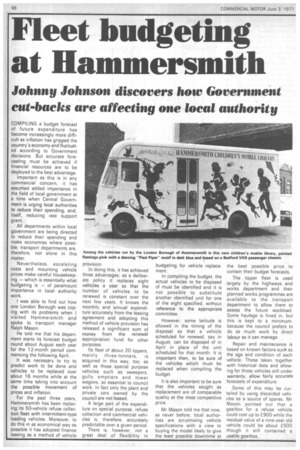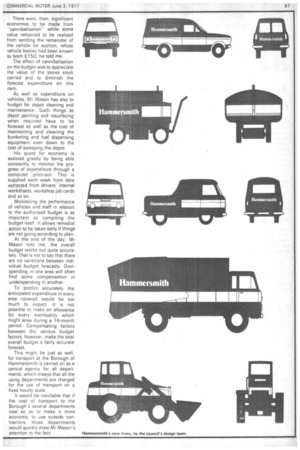Fleet budgeting at Hammersmith
Page 68

Page 69

If you've noticed an error in this article please click here to report it so we can fix it.
Johnny Johnson discovers how Government cut-backs are affecting one local authority
COMPILING a budget forecast of future expenditure has become increasingly more difficult as inflation has gripped the country's economy and fluctuated according to Government decisions. But accurate forecasting must be achieved if financial resources are to be deployed to the best advantage.
Important as this is in any commercial concern, it has assumed added importance in the field of local government at a time when Central Government is urging local authorities to reduce their spending, and, itself, reducing rate support grant.
All departments within local government are being directed to reduce their spending and make economies where possible; transport departments are, therefore, not alone in this matter.
Nevertheless, escalating costs and mounting vehicle prices make careful housekeeping — which is essentially what budgeting is of paramount importance in local authority work.
I was able to find out how one London Borough was coping with its problems when I visited Hammersmith and spoke to transport manager Ralph Mason.
He told me that his department starts its forecast budget round about August each year for the 12-month period commencing the following April.
It was necessary to try to predict work to be done and vehicles to be replaced over about 16 months while at the same time taking into account the possible movement of prices and inflation.
For the past three years, Hammersmith has been replac ing its 50-vehicle refuse collec tion fleet with intermittent-type loading vehicles. Moreover, to do this in as economical way as possible it has adopted finance leasing as a method of vehicle provision.
In doing this, it has achieved three advantages; as a deliberate policy it replaces eight vehicles a year so that the number of vehicles to be renewed is constant over the next few years. It knows the monthly and annual expenditure accurately from the leasing agreement and adopting this method of vehicle provision has released a significant sum of money from the renewal appropriation fund for other purposes.
Its fleet of about 20 tippers,
mainly three-tonners, is acquired in this way, too, as well as those special purpose vehicles such as sweepers, gully emptiers and tower wagons, so essential to council work. In fact only the plant and private cars owned by the council are not leased.
A large part of the expenditure on special purpose, refuse collection and commercial vehicles is, therefore, accurately predictable over a given period.
There is, however, not a great deal of flexibility in budgeting for vehicle replacement.
In compiling the budget, the actual vehicles to be disposed of must be identified and it is not possible to substitute another identified unit for one of the eight specified, without reference to the appropriate committee.
However, some latitude is allowed in the timing of the disposal so that a vehicle scheduled for .renewal, say in August, can be disposed of in April in place of the unit scheduled for that month. It is important then, to be sure of the vehicles which must be replaced when compiling the budget.
It is also important to be sure that the vehicles sought as replacement are of comparable quality at the most competitive price.
Mr Mason told me that now, as never before, local authorities are scrutinising vehicle specifications with a view to buying the model likely to give the least possible downtime at the best possible price to contain their budget forecasts.
The tipper fleet is used largely by the highways and works department and their planned works programmes are available to the transport department to allow them to assess the future workload. Some haulage is hired in, but this is kept to a minimum, because the council prefers to do as much work by direct labour as it can manage.
Repair and maintenance is based on known factors such as the age and condition of each vehicle. These taken together with historical data and allowing for those vehicles still under warranty, allow fairly accurate forecasts of expenditure.
Some of this may be curtailed by using discarded vehicles as a source of spares. Mr Mason pointed out that a gearbox for a refuse vehicle could cost up to £900 while the residual value of a nine-year old vehicle, could be about £500 though it still contained a usable gearbox. There were, then, significant economies to be made from
,"cannibalisationwhile some
value remained to be realised from sending the remainder of the vehicle for auction; refuse vehicle bodies had been known to fetch £150, he told me.
The effect of cannibalisation on the budget was to appreciate the value of the stores stock carried and to diminish the forecast expenditure on this item.
As well as expenditure 'on vehicles, Mr Mason has also to budget for depot cleaning and maintenance. Such things as depot painting and resurfacing when required have to be forecast as well as the cost of maintaining and cleaning the bunkering and fuel dispensing equipment even down to the cost of sweeping the depot.
His quest for economy is assisted greatly by being able constantly to monitor the progress of expenditure through a computer print-out. This is supplied each week from data extracted from drivers' internal worksheets, workshop job cards and so on.
Monitoring the performance of vehicles and staff in relation to the authorised budget is as important as compiling the budget itself. It allows remedial action to be taken early if things are not going according to plan.
At the end of the day, Mr .Mason told me, the overall budget works out quite accurately. That is not to say that there are no variations between individual budget forecasts. Overspending in one area will often find some compensation in, underspending in another.
To predict accurately the anticipated expenditure in every area covered would be too much to expect. It is not possible to make an allowance for every eventuality which might arise during a 16-month period. Compensating factors between the various budget factors, however, make the total overall budget a fairly accurate forecast.
This might be just as well, for transport at the Borough of Hammersmith is carried on as a central agency for all departments, which means that all the using departments are charged for the use of transport on a fixed hourly scale.
It would be inevitable that if the cost of transport to the Borough's several departments rose so as to make it more economic to use outside con tractors, those departments would quickly draw Mr Mason's attention to the fact.




















































































































